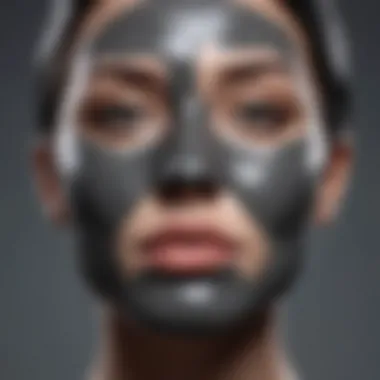Expert Tips for Choosing the Best Pimple Removal Face Wash for Clear Skin


Beauty Trends
In the realm of beauty trends, it's crucial to stay abreast of the latest makeup looks, techniques, and products that are making waves in the industry. From contouring to highlighting, the evolution of beauty standards emphasizes the importance of skincare. Comprehensive guides on skincare routines tailored for different skin types are essential for achieving that coveted glow. Product reviews demystify the plethora of options available, aiding in the selection of the ideal face wash for combating pimples. Expert tips delve into the nuances of skincare, focusing on personalized solutions for modern women seeking to enhance their beauty regimes.
Choosing the Best Pimple Removal Face Wash
Navigating through the myriad of face wash options can be daunting, especially when aiming to combat troublesome pimples. To embark on the journey of selecting the best pimple removal face wash, one must first understand the key ingredients that wield the power to cleanse and purify the skin. Ingredients like Salicylic Acid and Benzoyl Peroxide are renowned for their acne-fighting properties, penetrating deep into pores to eradicate impurities. However, it's vital to consider one's skin type to ensure compatibility and prevent adverse reactions. Combination, oily, dry, or sensitive skin all require tailored solutions to tackle pimples effectively. By equipping oneself with knowledge on ingredients and skin compatibility, the quest for the ideal face wash becomes a targeted and rewarding experience.
The Importance of Skincare Routine
Forging a consistent and appropriate skincare routine is fundamental in the pursuit of clear and blemish-free skin. Cleansing, toning, and moisturizing form the cornerstone of any regimen, with the face wash playing a pivotal role in the cleansing process. The right face wash not only rids the skin of dirt and excess oil but also targets acne-causing bacteria. By integrating a suitable face wash into a daily skincare routine, individuals can actively combat breakouts and prevent future blemishes. Understanding the significance of each step in a skincare routine empowers individuals to take control of their skin health, fostering a complexion that radiates health and vitality.
Personalized Skincare Solutions
Tailoring skincare solutions to individual needs is key in achieving efficacious results. Generic approaches often fall short in addressing specific concerns, necessitating a personalized regimen designed to tackle pimples effectively. Conducting a skin analysis to determine one's skin type and concerns lays the foundation for a targeted approach. Factors such as lifestyle, environmental influences, and hormonal fluctuations further inform the selection of a suitable face wash. By customizing skincare solutions to align with personal needs, individuals can harness the full potential of pimple removal face washes, propelling them towards clearer and healthier skin.
Synthesizing Information for Informed Decisions
As the journey towards choosing the best pimple removal face wash unfolds, synthesizing information becomes paramount in making informed decisions. Drawing upon insights on key ingredients, skin type considerations, and skincare routines, individuals can streamline their choices effectively. The fusion of expert recommendations, personal preferences, and scientific knowledge culminates in a well-rounded understanding of pimple removal strategies. Empowered with comprehensive information, individuals can transcend marketing gimmicks and make confident selections tailored to their unique skin needs. The pursuit of clear and blemish-free skin is not merely a quest but a calculated endeavor guided by knowledge and insight.
Understanding Pimples
In the realm of skincare, grasping the intricacies of pimples holds utmost significance. Understanding pimples is a pivotal element in the pursuit of flawless skin. By delving into the causes, types, and repercussions of pimples, one can formulate a targeted approach towards combating skin blemishes effectively. This article serves as a beacon of knowledge, shedding light on the complexities surrounding pimples and offering valuable insights for individuals seeking to attain clear and radiant skin.
Causes of Pimples
Hormonal Imbalance
The presence of hormonal imbalance stands as a prominent trigger for acne development. Hormonal fluctuations can incite an overproduction of sebum, the skin's natural oil, leading to clogged pores and subsequent acne formation. Understanding the role of hormonal imbalance in pimple emergence is crucial for tailoring skincare regimens to address this underlying cause effectively. While hormonal imbalance poses challenges in maintaining clear skin, awareness of its impact empowers individuals to select targeted treatments addressing this specific concern.
Excess Sebum Production
Excessive sebum production is a key player in the realm of pimple formation. When the sebaceous glands produce an abundance of oil, it can mix with dead skin cells, creating a breeding ground for acne-causing bacteria. Grasping the significance of regulating sebum production equips individuals with the knowledge needed to choose face wash products that balance oil levels without stripping the skin of its natural moisture. Managing excess sebum production through proper skincare routines is imperative in the battle against stubborn pimples.
Clogged Pores
Clogged pores serve as a common precursor to various forms of acne. When dirt, debris, and sebum accumulate within the pores, it provides an ideal environment for bacteria to proliferate, leading to inflammation and pimple formation. Recognizing the role of clogged pores in skin issues underscores the importance of thorough cleansing and exfoliation to prevent blockages and maintain clear skin. By understanding how clogged pores contribute to acne development, individuals can make informed choices in selecting face wash products tailored to tackle this underlying issue effectively.
Types of Pimples
Whiteheads


Whiteheads, also known as closed comedones, manifest as small bumps with white centers due to trapped sebum and dead skin cells. Understanding the nature of whiteheads is essential for formulating strategies to address them effectively. With proper skincare routines and targeted treatments, combating whiteheads and restoring skin clarity becomes achievable.
Blackheads
Blackheads, or open comedones, result from oxidized sebum exposed to air, forming dark pores on the skin's surface. Recognizing the distinct features of blackheads is pivotal in selecting face wash products designed to unclog pores and regulate oil production. By understanding how blackheads differ from other forms of acne, individuals can implement tailored approaches to banish these pesky blemishes.
Pustules
Pustules are characterized by inflamed, pus-filled lesions that can be painful and unsightly. Understanding the nature of pustules aids in implementing targeted treatments to reduce inflammation and promote healing. By recognizing the unique characteristics of pustules, individuals can navigate the sea of skincare products to find solutions that combat these inflammatory lesions effectively.
Nodules
Nodules are large, solid, painful lumps lodged deep within the skin layers, requiring careful handling to prevent scarring and further inflammation. Grasping the distinctive features of nodular acne is essential for selecting treatments that penetrate deep into the skin to address these stubborn blemishes effectively. By understanding the complexities of nodules, individuals can adopt holistic approaches to alleviate these severe forms of acne.
Cysts
Cysts present as large, painful bumps beneath the skin's surface filled with fluid or pus, posing a challenge in treatment due to their depth and potential for scarring. Recognizing the characteristics of cystic acne is crucial for choosing face wash products with potent ingredients capable of addressing cysts without exacerbating skin irritation. By understanding the nuances of cystic acne, individuals can embark on a targeted skincare journey to combat these severe blemishes effectively.
Impact of Pimples on Skin Health
Scarring
The aftermath of persistent acne often includes scarring, which can mar the skin's texture and appearance. Understanding the implications of acne scarring emphasizes the importance of proactive treatment to minimize scar formation. By addressing acne early on and adopting scar-reducing skincare practices, individuals can mitigate the long-term impact of blemishes on skin health.
Inflammation
Inflammation is a common consequence of acne, leading to redness, swelling, and discomfort. Recognizing the role of inflammation in acne development underscores the necessity of soothing inflamed skin with gentle, anti-inflammatory ingredients. By understanding how inflammation affects the skin, individuals can select skincare products that calm redness and reduce swelling, promoting quicker healing and skin restoration.
Low Self-Esteem
Acne can take a toll on one's self-esteem, causing feelings of self-doubt and insecurity. Understanding the emotional impact of acne on self-image highlights the importance of holistic treatment approaches that address both the physical and psychological aspects of acne. By acknowledging the link between acne and self-esteem, individuals can focus on building confidence from within while striving for clear and healthy skin.
Choosing the Right Face Wash
In this comprehensive guide to selecting the best pimple removal face wash, the section on Choosing the Right Face Wash plays a pivotal role. Understanding the significance of this topic is crucial as it forms the foundation for effective skincare. By focusing on key elements such as ingredients, skin type considerations, and the avoidance of harsh chemicals, individuals can make informed decisions tailored to their specific needs and preferences.
Key Ingredients to Look For
Salicylic Acid
Salicylic Acid is renowned for its exfoliating properties, penetrating deep into pores to effectively remove excess oil and dead skin cells. This ingredient is a staple in pimple removal face washes due to its ability to unclog pores and prevent future breakouts. The unique feature of Salicylic Acid lies in its gentle yet potent nature, making it a popular choice for those seeking clear and blemish-free skin.
Benzoyl Peroxide


Benzoyl Peroxide is known for its antibacterial properties, targeting acne-causing bacteria to reduce inflammation and promote healing. A key characteristic of Benzoyl Peroxide is its effectiveness in treating existing pimples and preventing new ones from forming. While this ingredient can be drying for some individuals, its benefits in combating acne make it a valuable addition to pimple removal face washes.
Glycolic Acid
Glycolic Acid, derived from sugarcane, offers exfoliation to eliminate dead skin cells and improve skin texture. Its key characteristic lies in its ability to enhance cell turnover and reduce acne scarring, making it a favored choice for those with acne-prone skin. Despite its potential for sensitivity, the advantages of Glycolic Acid in promoting skin renewal and clarity make it a sought-after ingredient in facial cleansers.
Tea Tree Oil
Tea Tree Oil is recognized for its antimicrobial properties, combating bacteria and soothing inflammation associated with acne. The key characteristic of Tea Tree Oil is its natural healing capability, making it an appealing choice for individuals seeking a gentle yet effective solution for pimple removal. While some may experience sensitivity to this ingredient, its benefits in calming troubled skin are well-documented.
Considerations for Skin Type
Oily Skin
For individuals with oily skin, selecting a pimple removal face wash that balances oil production is essential. The key characteristic of oily skin is its tendency to produce excess sebum, leading to clogged pores and breakouts. By choosing a face wash formulated to control oil and prevent acne, those with oily skin can achieve clearer and healthier skin.
Dry Skin
Individuals with dry skin require a pimple removal face wash that provides gentle cleansing without stripping the skin of essential moisture. The key characteristic of dry skin is its lack of natural oils, often resulting in flakes and tightness. Opting for a hydrating face wash tailored to dry skin can help maintain moisture levels and prevent irritation, promoting overall skin health.
Combination Skin
Combination skin poses a unique challenge, with some areas being oily while others are dry or normal. The key characteristic of combination skin is its varying needs across different facial regions. By choosing a face wash designed for combination skin, individuals can address both oiliness and dryness effectively, achieving balanced and clear skin.
Sensitive Skin
Individuals with sensitive skin require a gentle approach when selecting a pimple removal face wash. The key characteristic of sensitive skin is its reactivity to harsh ingredients, leading to redness and discomfort. Opting for a fragrance-free and hypoallergenic face wash can help those with sensitive skin prevent irritation and inflammation, ensuring a soothing and non-abrasive cleansing experience.
Avoiding Harsh Chemicals
Sulfates
Sulfates, commonly found in cleansing products, are known for their foaming properties but can be harsh on the skin. The key characteristic of sulfates is their ability to strip away natural oils, leading to dryness and potential irritation. By avoiding sulfates in face wash formulations, individuals can maintain skin's balance and prevent unnecessary dryness, promoting a gentler and more effective cleansing routine.
Parabens
Parabens, used as preservatives in many skincare products, have raised concerns due to their potential link to hormone disruption. The key characteristic of parabens is their ability to extend product shelf life but may pose risks to overall health. By choosing paraben-free face wash options, individuals can reduce exposure to potentially harmful chemicals, prioritizing skin and body wellness throughout their skincare regimen.
Artificial Fragrances
Artificial fragrances are added to many skincare products to enhance the sensory experience but can cause irritation in sensitive individuals. The key characteristic of artificial fragrances is their ability to evoke pleasing scents but may lead to allergic reactions or skin sensitivities. By opting for fragrance-free face washes, individuals can eliminate the risk of skin irritation and maintain a non-irritating routine, promoting skin health and comfort.


Tips for Effective Application
In this article, Tips for Effective Application plays a crucial role in providing actionable steps for achieving clear and blemish-free skin. Proper application techniques can significantly impact the efficacy of pimple removal face washes. By understanding the importance of gentle circular motions and avoiding over-scrubbing, individuals can maximize the benefits of their skincare routine. Consistency in application methods is key to addressing pimples effectively and maintaining overall skin health.
Proper Cleansing Techniques
- Gentle Circular Motions: The technique of Gentle Circular Motions involves delicately massaging the face wash onto the skin in circular movements. This method promotes thorough cleansing while preventing excessive irritation or damage to the skin. The gentle nature of circular motions ensures a deep yet gentle cleanse, making it a popular and effective choice for individuals looking to combat pimples without aggravating their skin.
- Avoid Over-Scrubbing: Over-scrubbing refers to applying excessive pressure or frequency when cleansing the face. This aggressive approach can strip the skin of its natural oils, leading to dryness and potential irritation. By avoiding over-scrubbing, individuals can protect their skin's barrier function and prevent additional breakouts, making it a prudent choice for promoting healthy skin.
Consistent Usage
- Morning and Evening Routine: Establishing a consistent morning and evening skincare routine is essential for addressing pimples effectively. By adhering to a set regimen, individuals can ensure that their skin receives the necessary care and treatment daily. Consistency in usage allows for the gradual improvement of skin condition over time, making it a valuable practice for achieving long-term results.
- Patience for Results: Patience is a vital aspect of skincare, especially concerning pimple removal. It takes time for products to show their full effects, and expecting immediate results can lead to frustration and potential discontinuation of treatment. By understanding the need for patience, individuals can stay committed to their skincare regimen and trust the process, ultimately leading to clearer and healthier skin.
Hydration and Moisturization
- Non-Comedogenic Moisturizers: Non-comedogenic moisturizers are specially formulated to hydrate the skin without clogging pores. This feature is crucial for individuals dealing with pimples, as it ensures that the skin remains moisturized without exacerbating acne. By choosing non-comedogenic options, individuals can maintain skin hydration without compromising on skincare goals.
- Importance of Hydration: Hydration is a fundamental aspect of skin health, particularly when addressing pimples. Adequately hydrated skin is more resilient to external stressors and less prone to inflammation, supporting the skin's overall balance. Emphasizing the importance of hydration can encourage individuals to prioritize this aspect of skincare, leading to improved skin condition and pimple management.
Additional Skincare Practices
In the realm of skincare, additional practices beyond the basic routine are pivotal for achieving optimal skin health and combating pesky blemishes like pimples. These complementary practices delve deeper into nurturing your skin and maintaining its balance. Exfoliation, diet, lifestyle choices, and seeking professional advice are some essential components of extra skincare practices that can elevate your skincare regimen to the next level of effectiveness and efficacy.
Exfoliation
Physical vs. Chemical Exfoliants
When it comes to exfoliation, there exists a fundamental difference between physical and chemical exfoliants. Physical exfoliants involve the use of abrasive substances like sugar scrubs or brushes to physically slough off dead skin cells, whereas chemical exfoliants employ acids like AHAs or BHAs to dissolve the bonds holding dead skin cells together. The key characteristic of physical exfoliants lies in their immediate smoothing effect on the skin texture, ideal for individuals with tougher skin or those looking for instant gratification. However, physical exfoliants may sometimes be harsh on the skin, leading to irritation, especially for sensitive skin types. On the other hand, chemical exfoliants offer a gentler yet deeper exfoliation, promoting cell turnover and unclogging pores effectively. This makes them a popular choice for individuals dealing with acne or seeking overall skin renewal.
Frequency of Exfoliation
Determining the frequency of exfoliation plays a crucial role in balancing skin health. Over-exfoliation can disrupt the skin's natural barrier, leading to increased sensitivity and irritation. It is generally recommended to exfoliate two to three times a week for most skin types, adjusting the frequency based on individual skin tolerance. By understanding the optimal frequency of exfoliation for your skin type, you can reap the benefits of smoother texture, improved skin tone, and enhanced product absorption without compromising the skin's integrity.
Diet and Lifestyle Factors
Role of Diet in Skin Health
The role of diet in skin health is undeniable, with research increasingly highlighting the impact of nutrition on skin appearance and function. Consuming a diet rich in antioxidants, vitamins, and minerals can promote skin repair, collagen synthesis, and overall vitality. Additionally, staying hydrated and avoiding excessive sugar and processed foods can help maintain skin hydration and reduce inflammation, contributing to a clearer complexion. A well-balanced diet not only nurtures your skin from within but also complements external skincare efforts, synergistically enhancing the skin's resilience and radiance.
Stress Management Techniques
Stress is often an overlooked yet significant factor in skin health, as increased stress levels can trigger hormonal imbalances, inflammation, and exacerbate existing skin conditions like acne. Stress management techniques such as mindfulness, meditation, exercise, and adequate sleep play a crucial role in maintaining a healthy skin barrier and reducing the impact of stress on the skin. By prioritizing stress management as part of your skincare routine, you can promote skin healing, prevent premature aging, and foster a harmonious balance between your mental well-being and skin health.
Consulting a Dermatologist
Professional Advice
Seeking professional advice from a dermatologist is a valuable resource for navigating persistent skin issues and developing a tailored treatment plan. Dermatologists offer expert insights into your skin condition, personalized recommendations for effective products, and treatment options tailored to your specific needs. Their diagnostic expertise and access to prescription treatments can address underlying skin concerns with precision, ensuring comprehensive care and optimal results. By collaborating with a dermatologist, you can embark on a targeted skincare journey that prioritizes both short-term improvements and long-term skin health.
Prescription Treatments
In some cases, over-the-counter products may not suffice in addressing stubborn acne or skin issues, necessitating the use of prescription treatments prescribed by a dermatologist. Prescription treatments encompass a range of topical or oral medications formulated to target acne-causing bacteria, regulate sebum production, or promote skin regeneration. These treatments, such as retinoids, antibiotics, or anti-inflammatory medications, offer a higher potency than conventional products, delivering faster and more pronounced results. However, the use of prescription treatments requires careful monitoring and compliance with the dermatologist's instructions to ensure efficacy and minimize potential side effects, highlighting the importance of professional guidance in managing complex skin conditions.







